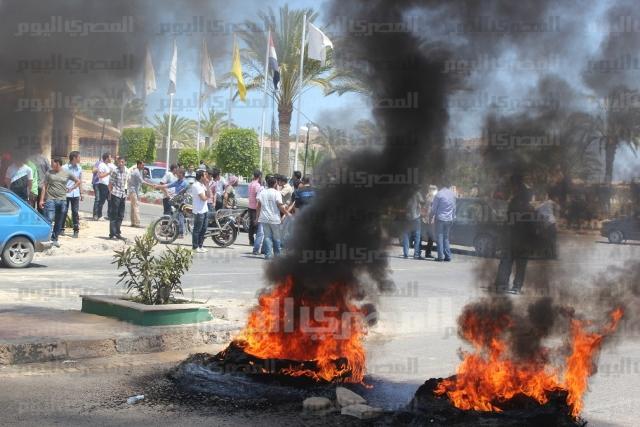
“Only in Egypt: you object to the Emergency Law, they change its name to the ‘protecting society from criminals’ law; you object to that and its name becomes the ‘safeguarding the gains of the revolution’ law.”
This was the reaction of lawyer and activist Malek Adly on his Twitter account when state-run Al-Ahram newspaper reported last week that the government had finished preparing the “safeguarding the revolution’s gains law” that aims to, according to the paper, “abort the attempts of anti-revolution powers to use criminals in order to achieve personal political gains.”
Despite its appealing name, human rights defenders say that the draft law, proposed by the Cabinet, is only the latest of many government attempts to sugarcoat the emergency law and bring it back.
Human rights advocates say that the new law is so much more harmful to personal rights than its infamous predecessor that it will have rights defenders longing for the days of the emergency law.
Lawyers say since the Supreme Council of the Armed Forces lifted the state of emergency last year, the new government has been trying to bring it back through a series of proposed legislation.
The Cairo Institute for Human Rights Studies issued a report on Sunday titled, “The laws for the punishment of the Egyptian revolution,” saying that the Interior Ministry has proposed five new laws since the lifting of the state of emergency last year. The report claims the ministry is attempting to reclaim the exceptional powers and protection it became accustomed to during 30 years under Emergency Law.
“The proposed legislation helps to legalize oppression and incorporate exceptional procedures — that were not accepted even under the state of emergency — in the regular legal system, which leads to worries that the Interior Ministry wants to provide a permanent alternative to the Emergency Law,” the CIHRS report states.
With a dismantled parliament, Justice Minister Ahmed Mekky proposed in August a new emergency law, with some “improvements,” through a special committee in order to restore the state of emergency, claiming that it’s necessary due to the continuing security void.
After the return of the infamous state of emergency was rejected, the Interior Ministry proposed another new law under the heading “the protection of society from criminals,” which gives the government exceptional powers against those labeled as “accustomed to crime.”
After this draft bill was also rejected by civil society, a slightly modified draft resurfaced last week under the name “safeguarding the gains of the revolution.”
Experts say that while they claim to protect the revolution’s gains, these laws mainly aim at empowering police to crack down on continued protests by workers and political forces.
The Cabinet has also proposed another law to criminalize obstruction of work. A similar law was imposed by the ruling military council in 2011 stating that any protest carried out under the state of emergency and leading to the obstruction of work is punishable by incarceration and a fee of between LE20 and LE100,000.
The new law proposed by the government removes the section tying it to the emergency state, making it a permanent law, and increases the penalty. The draft bill also extends the punishment to anyone who incites or promotes the obstruction of work, even if their attempt was unsuccessful.
The “safeguarding the gains of the revolution” bill would give the Interior Ministry the right to take measures against “those accustomed to crime who threaten or insinuate the use of violence against people or buildings” and “those who endanger the security and safety of individuals and society or terrorize people’s lives or possessions.”
The law elaborates that those “accustomed to crime” include repeat offenders of theft, abduction, bribery, weapons and drugs trafficking and road obstruction, among other crimes.
“They mention a dozen regular crimes in order to sneak in the obstruction of roads, which is what they are really targeting with this law,” says Gamal Eid, the head of the Arab Network for Human Rights Information.
Eid says that while the law includes other crimes to make it more socially acceptable, its main aim is to enable the government to crack down on protests.
Additionally, lawyers say that the use of vague terms and the loose wording of the articles allows for the misuse of the law to curb political opposition.
Terms such as “endangering the general order,” “endangering stability,” and “terrorizing people” can be interpreted to criminalize freedom of expression, Eid says. “An article in a newspaper can be considered a danger to stability; these are the terms that Mubarak used.”
The earlier version of the law, still under consideration, also allows the ministry to take preemptive measures against acts that show intent to endanger society, which lawyers say gives the Interior Ministry a dangerous power to judge and punish intent.
CIHRS says that applying the law to those with past convictions of certain crimes is against the constitutional principle that people are innocent until proven guilty.
According to the CIHRS report, “This means that you can be walking by a protest and get arrested just because you have participated in protests before, considering that it is considered a crime under this law.”
The law allows the police to take one or more of the following actions against those who fall under the categories mentioned for a maximum of 30 days with no legal procedures: putting them under house arrest, prohibiting their presence in certain locations, or putting them under police surveillance.
Lawyers say that the law could be abused to harass protesters, with measures such as banning them from being at the location of a protest or keeping them under continuous surveillance.
Additionally, the law states that a sentence reached under this law should be immediately put into effect, even if the verdict is appealed, and that the time the suspect spends incarcerated until a verdict is reached is not to be subtracted from the sentence. These measures are unprecedented and illegal, Eid says.
The formation of the court that settles the cases of those arrested under this law is also controversial. The earlier version of the law, proposed under the name “the protection of society from criminals,” states that those arrested under the law are to be tried before a special court composed of a judge and two expert assistants, one from the Interior Ministry and the other from the Social Affairs Ministry. The experts file a report to the judge before he issues a verdict.
With non-judicial members in the court, one of them belonging to the Interior Ministry, Eid says that the court designed in the law is both unconstitutional and biased.
Eid adds that the danger of these laws is that while the Emergency Law allowed oppressive administrative procedures that lawyers could fight in courts, the new laws incorporate the measures allowed by the Emergency Law into the legal system itself.
Many political forces have declared their rejection of these laws and recognized them as a new form of the Emergency Law. The Popular Current released a statement last week rejecting the new law and calling it the “safeguarding the gains of oppression law.”
CIHRS demands that President Mohamed Morsy, as the current holder of legislative powers in Egypt, reject these laws, saying that this is the true test of his position toward freedom and human rights.
According to the organization, “The choice that the president is facing now is either to reject these laws or to accept them and inaugurate a new era of the rebuilding of the police state that the 25 January revolution tackled with a strong blow.”




